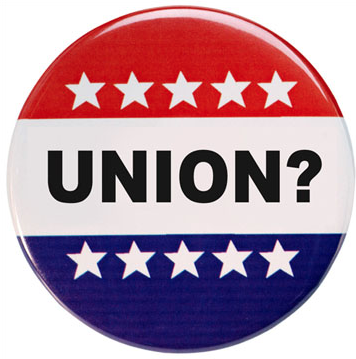Jencunas: RI Unions - When You’re Out, You’re Out
Friday, April 03, 2015
Rhode Island unions are going to learn the truth of an old political saying, “when you’re out, you’re out.” I first heard that from Bob Dole, who was talking about how many Senators he knew who lost reelection and suddenly realized how few friends they really had.
It’s true for interest groups as well, and as the labor endorsement no longer translates to victory at the ballot box, labor unions will see that their allies are few and far between. The 2011 pension reform law has been finalized by a settlement, and the future will hold more defeats for Rhode Island’s public sector unions.
Barring some unforeseen incident, the pension settlement between Rhode Island and the state’s many public sector unions is a done deal. The terms haven’t been made public yet, but all but two unions have voted to accept them. Functionally, that means every union has accepted them, since the dissenters don’t have the resources to effectively continue the legal battle.
GET THE LATEST BREAKING NEWS HERE -- SIGN UP FOR GOLOCAL FREE DAILY EBLASTThe settlement means the 2011 law that reduced future retirement benefits by $4 billion will remain mostly intact. This saves the state hundreds of millions of dollars a year. However, the settlement concedes $290 million in total unfunded pension liability compared to if the 2011 law were implemented as intended.
The Legal Merits
On the legal merits, the settlement is unsurprising. Legal experts thought the merits favored the state, but neither side could risk losing at trial. For the unions, defeat would make it easier for the state to make pension cuts, since they wouldn’t fear litigation. For the state, defeat would end any hope of reforming the overly generous pension deals of yesteryear.
If a Rhode Island politician from the 80s or 90s read about the settlement, they’d think the state was wrong. Pension deals were something that might happen down South, or in the Midwest, but in Little Rhody labor’s power was unassailable.
Back then, labor got results. Teachers went on strike in 1984, defying a court order, and were rewarded with generous concessions. In 1994, the fire fighters union’s endorsement of Buddy Cianci was a major factor in his reelection. In 1996, labor opposition was a key factor in Joe Paolino’s surprising loss to an unknown challenger in the Democratic Congressional primary.
The statehouse was dominated by representatives who were friendly to labor, with many representatives earning generous salaries in union sinecures. The judiciary was similarly friendly. In 1983 giving unions total control over pension adjustments in Providence. the Supreme Court ruling in favor of 6% COLAs in 2000.
Changing Times
Times have changed. Labor’s foe Gina Raimondo handily won the Democratic primary, helped by a labor movement so disorganized they backed two separate opponents. Buddy Cianci was defeated in his comeback despite being endorsed by all of Providence’s major public unions. In the general election, labor endorsed Raimondo but only because her opponent’s positions were even less pro-union. For Lieutenant Governor, the union endorsement of Republican Catherine Taylor did nothing to help her against Dan McKee.
Labor isn’t powerless – the teachers’ union helped Speaker Mattiello oust recalcitrant Rep. Maria Cimini – but their recent electoral record has far more losses than wins.
These defeats will have real consequences for public sector unions. With Rhode Island constantly facing budget deficits, expect more pension reductions as politicians try to protect more politically powerful allies from the pain of budget cuts.
How can unions reverse their fortunes? By making hard choices and looking like part of the solution on pensions, not part of the problem. The settlement is a good choice for them, and unions should try and claim the lion’s share of the credit for the deal. The two unions who refuse to settle should be criticized, loudly and frequently, by the other unions.
This reasonableness should be repeated in future negotiations with the state, with unions focusing on limiting their losses rather than trying to hold the line against concessions. It will be painful for them, though heartening to me as a Republican, but it’s their best chance to rebuild credibility and therefore have more clout in future elections.
Will they heed my advice? I doubt it. It’s always hard to convince people to take short-term pain for long-term gain, but it’s their best choice. Otherwise, this will be first of many losses an organized labor movement that just isn’t what it used to be.
Brian Jencunas works as a communications and media consultant. He can be reached at [email protected] and always appreciates reader feedback.
Related Articles
- Jencunas: Juno Response Big Win For RI Elected Officials
- Jencunas: Obama’s State of the Union Victory Lap - and Wish List
- Jencunas: How Romney Can Win in 2016
- Jencunas: Elorza’s Challenges and His Best Chance at Success
- Jencunas: Gist’s Departure Leaves RI Education at Crossroads
- Jencunas: Residency Requirements - Bad Idea For City Boards
- Jencunas: Gore in 2016?
- Jencunas: Potholes - An Opportunity for Elorza
- Jencunas: The Gordon Fox Saga - An Opportunity For Republicans
- Jencunas: Providence PawSox Stadium - Boon or Bust?
- Jencunas: RI Unions - When You’re Out, You’re Out




